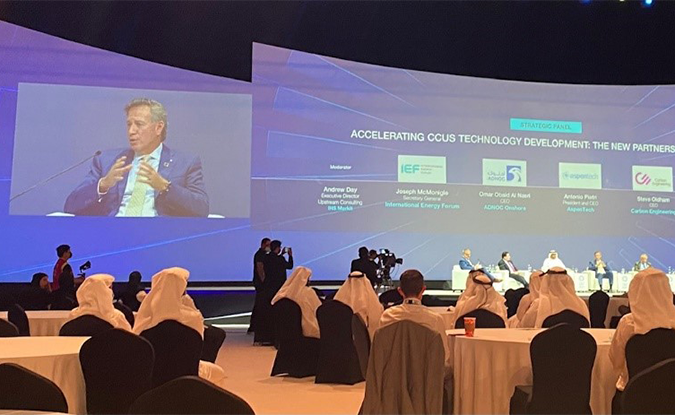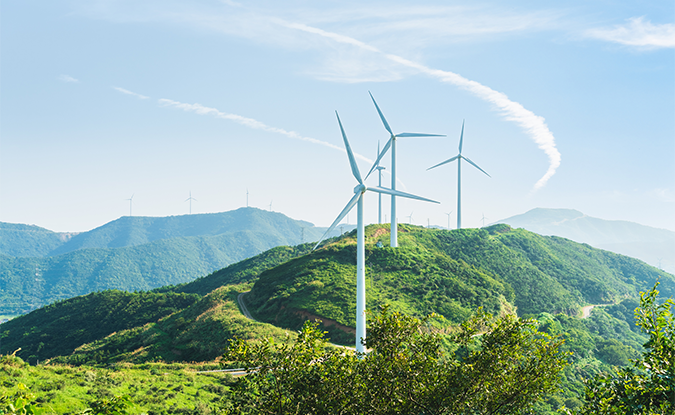I was privileged to join two clear communicators and thinkers, Dr. Bela Kelemen (Business Excellence VP at MOL Group) and Mr. Pino (Giuseppe) Ricci (Chief Operating Officer of Energy Evolution for ENI), for an online executive conversation on November 2, 2021. The topic was the “Dual Challenge,” that is accelerating the journey to sustainable energy and providing affordable energy to a world with a rapidly growing middle class and steadily growing energy demand.

The two leading European energy executives spoke candidly about the approaches their respective companies are taking, and the challenges facing the energy industry in Europe, interspersed with observations, advice and views. It was a timely and thought-provoking discussion, and I invite you to listen to it on demand. Here are a few highlights and takeaways from the conversation:
On the Challenges Facing Europe
Europe is aggressively pursuing net zero carbon (CO2) targets, faster than other regions and has been quite ambitious in its drive towards sustainability, and aggressive in turning this ambition into government action. Several leading industry experts are saying this puts Europe at greater risk than the rest of the world in terms of the short-term costs of natural gas and electricity, and impacts on consumers.
On the European Refining Industry
There are global imbalances in the energy and carbon markets, in economic recovery from the pandemic and in sustainability policies. This “uneven” environment puts European refineries in a vulnerable position. Europe’s pursuit of net zero targets, more aggressive than other regions, is leading to higher prices for power and fuel, and potential supply shortages.
On the Regulatory Challenges in Europe
Both executives feel there is a risk of Europeans, and other regions, regulating the approach, not the end goal. The best path would be to take “ideology” completely out of the equation. Instead regulate the objective, which is the minimization of greenhouse gases, and enable the energy industry and the research community to innovate towards that end goal.
Some countries do not have a regulatory framework to enable technologies such as carbon capture and storage. This is holding back projects in some cases. Regulations need to change in many countries and regions throughout the world so these sustainability-focused initiatives, and others like it, can get underway.
On Energy Efficiency
Existing facilities must keep operating to meet demand today and tomorrow. Pragmatism is required. Plants need to run as efficiently as possible, both to reduce carbon and increase margin to invest in energy transition. The opportunity to increase energy efficiency of plants is “limitless” in the words of Dr. Kelemen.
On the Crucial Need for Global Collaboration
Geographic inequalities will play a big role. Generation potential for renewables is regional, for instance wind in the North Sea, solar in Morocco, geothermal in Iceland.
Collaboration is necessary to take advantage of the opportunities and limitations of each region (i.e., where carbon can be sequestered there needs to be the right subsurface reservoirs; where existing transportation infrastructure can be converted for instance from natural gas pipelines to hydrogen or CO2).
Collaboration is needed not just between players in the energy industry, but also between industries. For instance, ENI is using its carbon capture expertise to partner with the steel and cement industries to decarbonize difficult to decarbonize industrial processes, take the captured carbon and place it into secure storage.
On Biofuels
ENI is the world’s second largest biofuels producer behind Neste. Feedstock for biorefineries provides another opportunity for collaboration. It’s important to look at “the big picture” of sustainability. For example, biofuels sourced in a region like Africa creates employment for hundreds of people per location and cultivates the feedstock for a biofuels value chain.
The biofuels industry could employ 1,000-2,000 workers per 1,000-2,000 hectares of biofeedstock production in areas which are not productive today, such as in some parts of Africa with high unemployment and a low standard of living. The less volatile price structures of biofeedstocks balances the volatility of traditional energy markets and reduces the carbon intensity of fuels.
On Hydrogen and CO2
For green hydrogen, it’s important to consider the technology. Economics naturally follows successful technologies. Technologies exist. But are they robust and scalable today? Can the necessary technologies in the value chain scale large enough and fast enough?
When considering blue vs green, the technology for reforming is proven. But for blue hydrogen, the carbon capture technology still requires innovation to scale up.
On Electrification
Electrification introduces a whole new arena of dependencies and value chain constraints. The concentration of battery technology and of rare earth minerals within a few countries or a few economies, will create a different kind of imbalance looking ahead.
In Summary
This frank and fact-based discussion, which I was delighted to be part of, comes at a key juncture, following on the heels of COP26, held in Glasgow, and the global energy conference, ADIPEC, which took place in Abu Dhabi. The discussion paints a pragmatic picture of the path forward for energy in Europe, the issues being faced and the uncertainties.
After you listen to the conversation on demand, please comment here, or share your thoughts with me on LinkedIn.





Leave A Comment